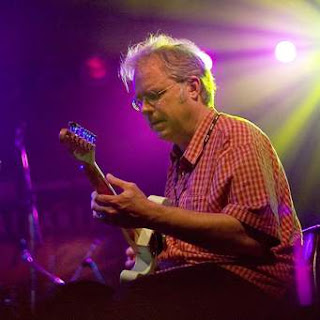A pillar of modern jazz guitar: Bill Frisell plays a solo gig for Indy Jazz Fest at the Jazz Kitchen
Not many jazz musicians can carry off a concert unaccompanied. Success alone is more likely to come to players
of a harmony instrument, chiefly the piano. But the guitar has a long history of more than one line at a time, and the advent of sophisticated electronics over the past half-century has given this "people's instrument" legitimate currency in jazz soloing among adventurous players.
Perhaps no one has expanded the guitar's vocabulary more persistently and with more variety than Bill Frisell. With a solid-body electric guitar on one side, supplemented by a row of foot pedals and finger-operated switches in front of him, and an acoustic instrument to his left, Frisell offered ample proof of his range in two Indy Jazz Fest sets Tuesday evening at the Jazz Kitchen.
I attended the second set, also played to a full room. Starting out, Frisell seemed to be exploring new harmonies on a couple of standards, Thelonious Monk's "Ask Me Now" (if memory serves, though at the age I turned yesterday, it often swerves instead) and Billy Strayhorn's "Lush Life." The melodic line was broken up, sometimes adhering to an exploratory manner a little more than it should have. The crunchiness of the result, and the certainty that we were not just listening to a student guitarist feeling his way, promised good things to come.
Blues took over in a segue to a third theme, in which Frisell introduced loops to thicken the texture and set different lines in playful opposition. There was an episode in octaves that tempted me to think he was paying explicit tribute to Indianapolis' favorite son on the guitar, Wes Montgomery. But who knows for sure? There was also more than a hint of country pickin' before Frisell settled into the Beatles' "In My Life." The soloist really got the counterpoint going, channeling the baroque-flavored harpsichord chorus in the original.
Holding the audience spellbound, Frisell picked up the acoustic guitar to etch an effective personalization of "My Man's Gone Now" from "Porgy and Bess." Without overstating it, he captured a true feeling of lamentation. The mood continued in that classic of regretful waste, "Days of Wine and Roses." It was an effective pairing.
A long excursion on electric guitar brought the set to its official end. He enunciated a strong tenor melody and brought in lots of loops and so many different colors in different registers that theater or pipe organists might well be jealous. The grandiose nature of this section made the emergence of the anthemic "This Land Is Your Land" seem like the inevitable choice, complete with a brief sojourn through "What the World Needs Now."
Frisell's encore put a cap on a heart-warming performance as it referenced "Blowin' in the Wind" as support for a lengthy, solemn interpretation of "We Shall Overcome." In times like these, especially when you hear versions of much-loved tunes that are free of cliche and rich in thoughtful variation, how can an audience be anything but impressed enough to roar its approval?
 |
| Bill Frisell gets down to business on the bandstand. |
Perhaps no one has expanded the guitar's vocabulary more persistently and with more variety than Bill Frisell. With a solid-body electric guitar on one side, supplemented by a row of foot pedals and finger-operated switches in front of him, and an acoustic instrument to his left, Frisell offered ample proof of his range in two Indy Jazz Fest sets Tuesday evening at the Jazz Kitchen.
I attended the second set, also played to a full room. Starting out, Frisell seemed to be exploring new harmonies on a couple of standards, Thelonious Monk's "Ask Me Now" (if memory serves, though at the age I turned yesterday, it often swerves instead) and Billy Strayhorn's "Lush Life." The melodic line was broken up, sometimes adhering to an exploratory manner a little more than it should have. The crunchiness of the result, and the certainty that we were not just listening to a student guitarist feeling his way, promised good things to come.
Blues took over in a segue to a third theme, in which Frisell introduced loops to thicken the texture and set different lines in playful opposition. There was an episode in octaves that tempted me to think he was paying explicit tribute to Indianapolis' favorite son on the guitar, Wes Montgomery. But who knows for sure? There was also more than a hint of country pickin' before Frisell settled into the Beatles' "In My Life." The soloist really got the counterpoint going, channeling the baroque-flavored harpsichord chorus in the original.
Holding the audience spellbound, Frisell picked up the acoustic guitar to etch an effective personalization of "My Man's Gone Now" from "Porgy and Bess." Without overstating it, he captured a true feeling of lamentation. The mood continued in that classic of regretful waste, "Days of Wine and Roses." It was an effective pairing.
A long excursion on electric guitar brought the set to its official end. He enunciated a strong tenor melody and brought in lots of loops and so many different colors in different registers that theater or pipe organists might well be jealous. The grandiose nature of this section made the emergence of the anthemic "This Land Is Your Land" seem like the inevitable choice, complete with a brief sojourn through "What the World Needs Now."
Frisell's encore put a cap on a heart-warming performance as it referenced "Blowin' in the Wind" as support for a lengthy, solemn interpretation of "We Shall Overcome." In times like these, especially when you hear versions of much-loved tunes that are free of cliche and rich in thoughtful variation, how can an audience be anything but impressed enough to roar its approval?



Comments
Post a Comment